AI and the underwater astronaut
A recent conversation about prompt engineering led to the inevitable impressionist rendering of an astronaut eating a burger underwater.
Read moreAutomation in IT operations enable agility, resilience, and operational excellence, paving the way for organizations to adapt swiftly to changing environments, deliver superior services, and achieve sustainable success in today's dynamic digital landscape.
Next-generation application management fueled by AIOps is revolutionizing how organizations monitor performance, modernize applications, and manage the entire application lifecycle.
AIOps and analytics foster a culture of continuous improvement by providing organizations with actionable intelligence to optimize workflows, enhance service quality, and align IT operations with business goals.
From personalized shopping experiences to autonomous vehicles, Artificial Intelligence (AI) is driving efficiency and unlocking unprecedented possibilities. However, one of its most transformative applications lies in the realm of IT Service Management (ITSM), where AI is revolutionizing how enterprises manage and resolve incidents, ensuring smarter, faster, and more efficient IT operations.
As enterprises scale their IT infrastructure to keep pace with business demands, the complexity of managing incidents and service requests grows exponentially. Traditional ITSM systems, reliant on manual processes, struggle to meet the need for real-time resolutions. This is where AI-powered ITSM comes into play—leveraging predictive analytics, machine learning, and automation to optimize incident management, minimize downtime, and elevate user satisfaction.
A recent survey found that 48% of M&A professionals are now using AI in their due diligence processes, a substantial increase from just 20% in 2018, highlighting the growing recognition of AI’s potential to transform M&A practices.
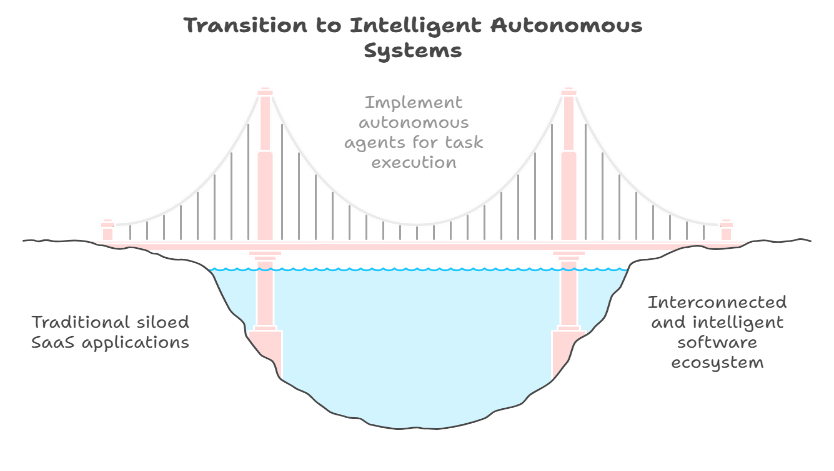
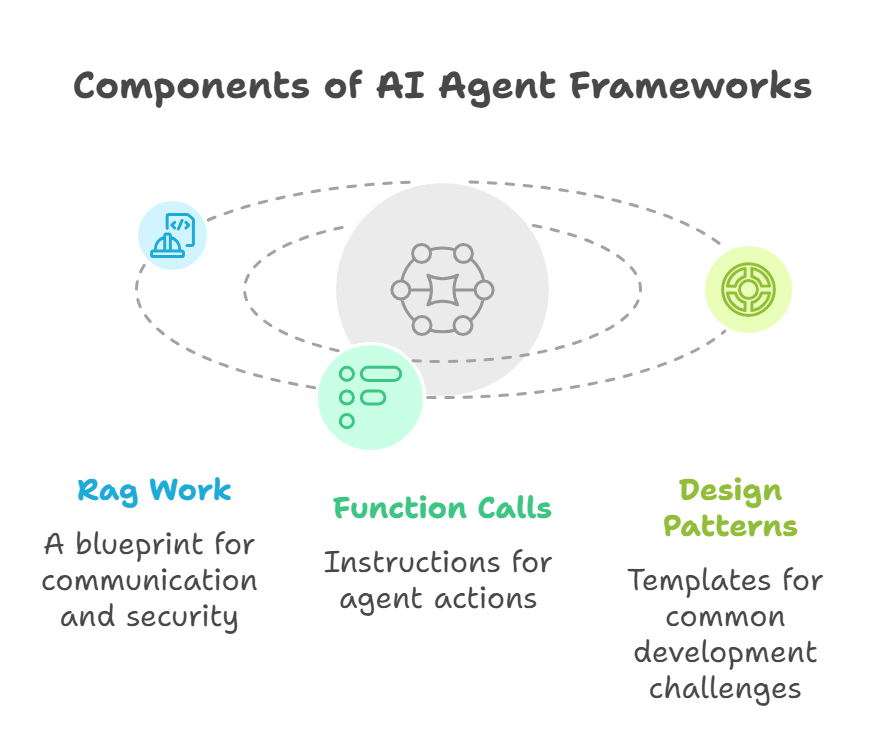
Traditional ITSM frameworks have predominantly relied on manual processes and reactive responses to incidents. These approaches, though functional, often lead to prolonged resolution times, increased operational costs, and poor service quality. Organizations are now shifting towards AI-powered ITSM to address these challenges. This evolution is driven by the need to:
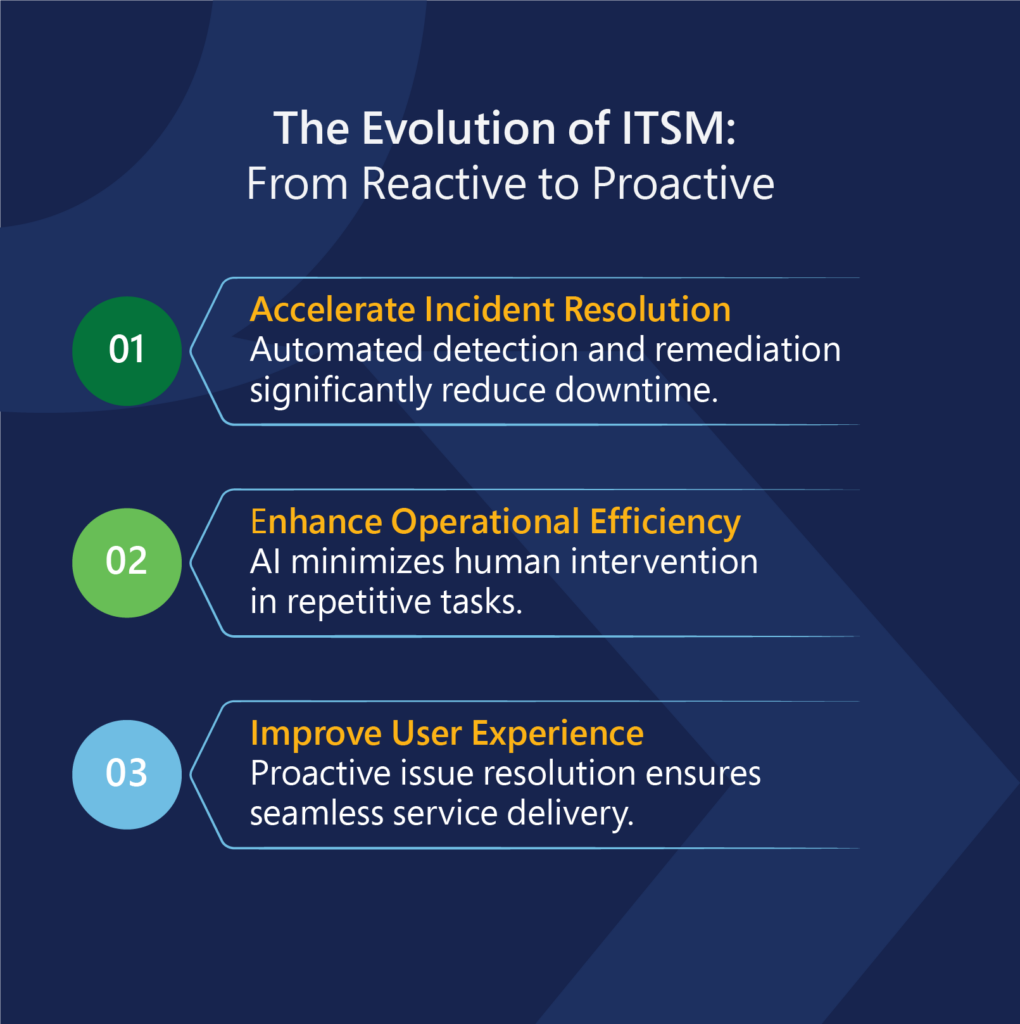
However, as enterprises explore AI-driven ITSM solutions, a lingering hesitation remains among CIOs and IT leaders. This blog delves into why CIOs are cautious, how AI is laying the foundation for smarter ITSM, and how platforms like Qinfinite are leading this revolution.
Download Now: The State of AIOPS and The Emergence of iAM
Despite the undeniable potential of AI, many CIOs remain hesitant to adopt AI-powered solutions for ITSM. Concerns such as high implementation costs, data security risks, and the perceived complexity of AI technologies often act as barriers. Additionally, there’s a lingering skepticism about whether AI can truly understand the nuances of IT environments or whether it might replace human expertise entirely.
However, the hesitation may prove more costly than the challenges. Businesses operating without AI-powered ITSM are prone to longer incident resolution times, increased operational inefficiencies, and a lack of actionable insights from incident data. As the gap between manual ITSM processes and enterprise needs widens, CIOs are recognizing that standing still is no longer an option.

Dynamic Risk Assessment: In telecom, data privacy regulations (like GDPR) are crucial. AI assesses the impact of privacy regulations on customer data handling practices, ensuring compliance without compromising service.
Example: AI helps telecom providers audit data storage practices to align with GDPR, ensuring customer privacy and regulatory adherence.
Automated Policy and Document Updates: Retailers must adapt to consumer protection and employee rights regulations. AI updates internal policies based on regulatory changes, keeping customer interactions and employee practices compliant.
Example: AI generates new training material for customer service teams when consumer rights regulations are updated, ensuring compliance with minimal manual effort.
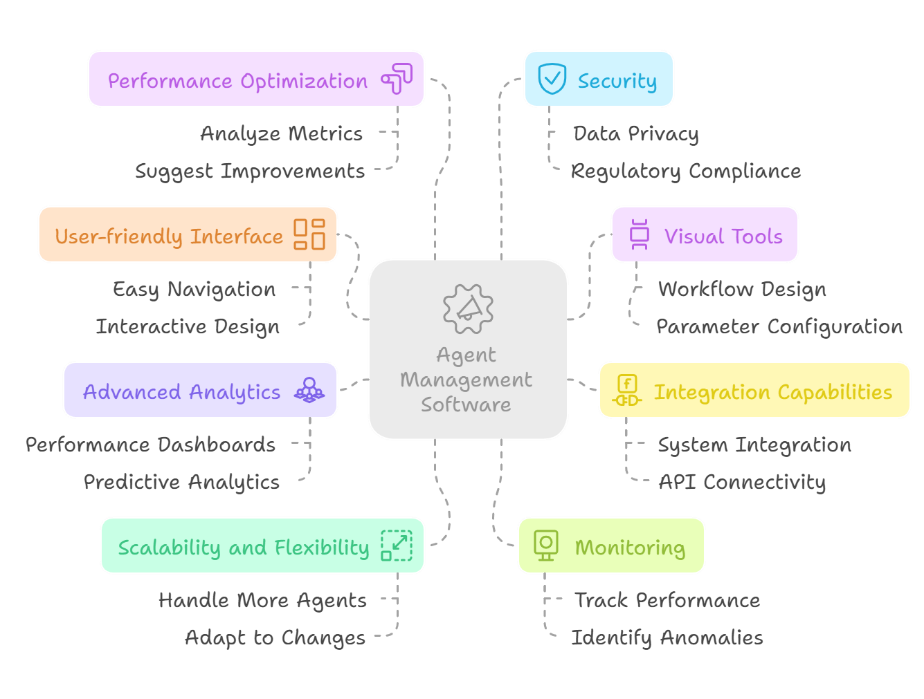
AI-powered ITSM transforms traditional IT service management by addressing its inherent pain points—slow resolution times, repetitive tasks, and fragmented data. Here’s how AI lays the foundation for a smarter ITSM:
With iAM, every application becomes a node within a larger, interconnected system. The “intelligent” part isn’t merely about using AI to automate processes but about leveraging data insights to understand, predict, and improve the entire ecosystem’s functionality.
Consider the practical applications:
AI eliminates guesswork in incident management by automatically categorizing and prioritizing tickets based on predefined criteria, historical data, and predictive analytics. Using Natural Language Processing (NLP), AI-powered ITSM tools can analyze ticket descriptions and determine the appropriate resolution path or assign it to the right team. Platforms like Qinfinite use advanced AI agents to automate ticket classification, routing, and resolution, significantly reducing manual effort.

AI enables IT teams to identify patterns in incident data, predicting potential issues before they escalate. For instance, if multiple users report slow application performance, the system can flag the underlying issue—be it a server overload or network latency—and suggest preventive measures. In fact, AI-driven automation in ITSM can reduce incident resolution times by up to 50%.
For example, Qinfinite’s predictive insights can forecast server downtimes or network bottlenecks, allowing IT teams to address issues before they impact users.
AI-powered ITSM platforms use robotic process automation (RPA) to handle routine tasks, such as password resets, software updates, and system checks. This frees up IT personnel to focus on strategic initiatives rather than repetitive chores. Automating repetitive tasks in ITSM saves companies an average of 30-50% in operational costs.
AI-driven chatbots deliver 24/7 support, addressing user queries, guiding them through troubleshooting steps, and even resolving low-complexity issues autonomously. These chatbots, powered by machine learning, continuously improve their responses, enhancing the user experience over time.
AI-driven root cause analysis (RCA) pinpoints the underlying reasons for incidents, enabling faster remediation. Qinfinite’s RCA agents, for instance, automate the identification of root causes and suggest precise solutions, reducing resolution times and improving system reliability.
Qinfinite, our intelligent application management platform takes AI-powered ITSM to the next level, providing a comprehensive solution that empowers enterprises to streamline operations, improve service availability, and enhance user satisfaction. Here are the key benefits of adopting Qinfinite for incident management:
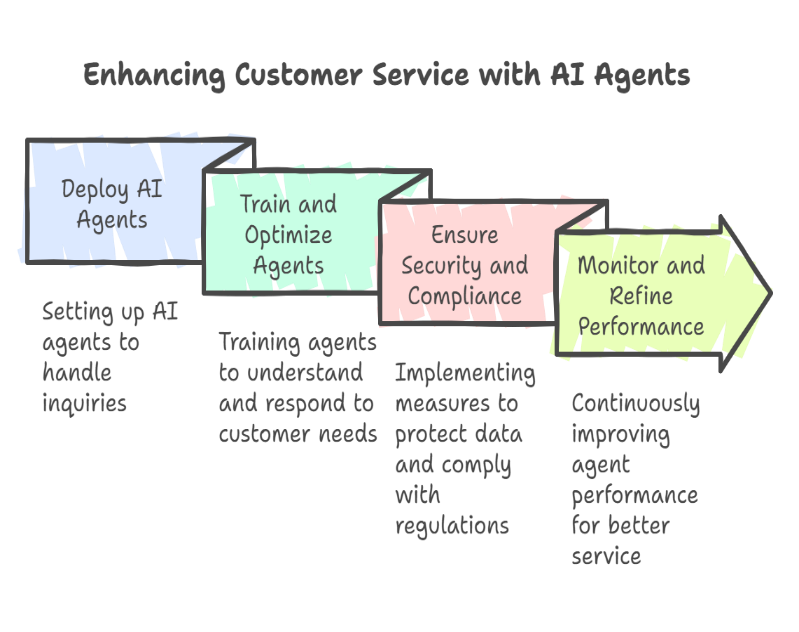
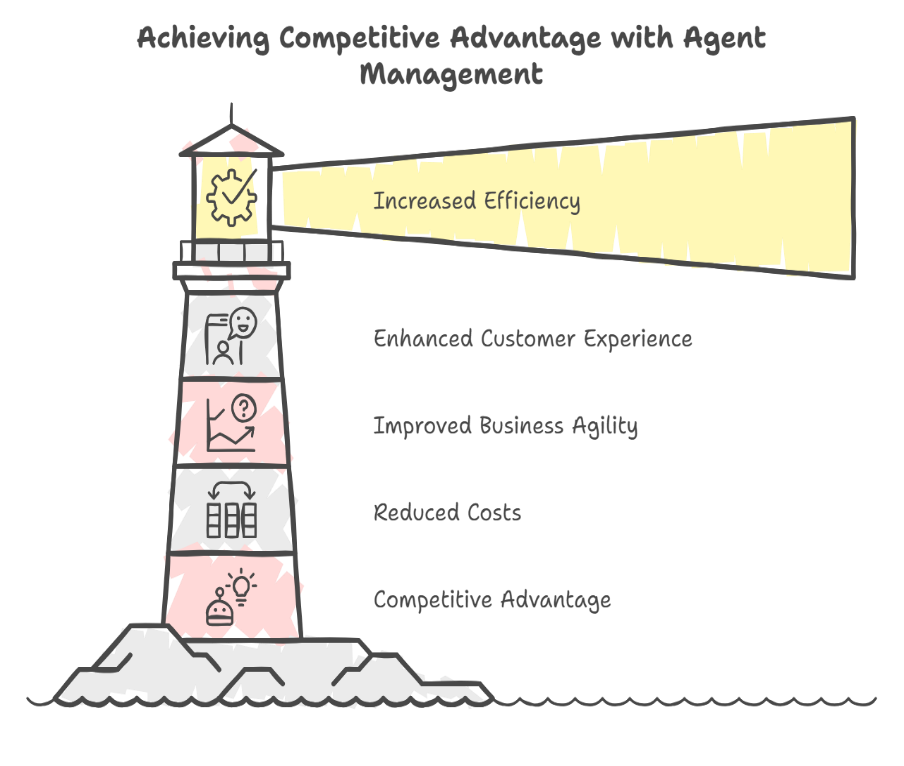
The rise of agent-driven systems marks a significant shift in the technology landscape. By embracing Agent Management Services, organizations can navigate this new era with confidence, unlock the full potential of AI, and gain a competitive advantage in the digital age.
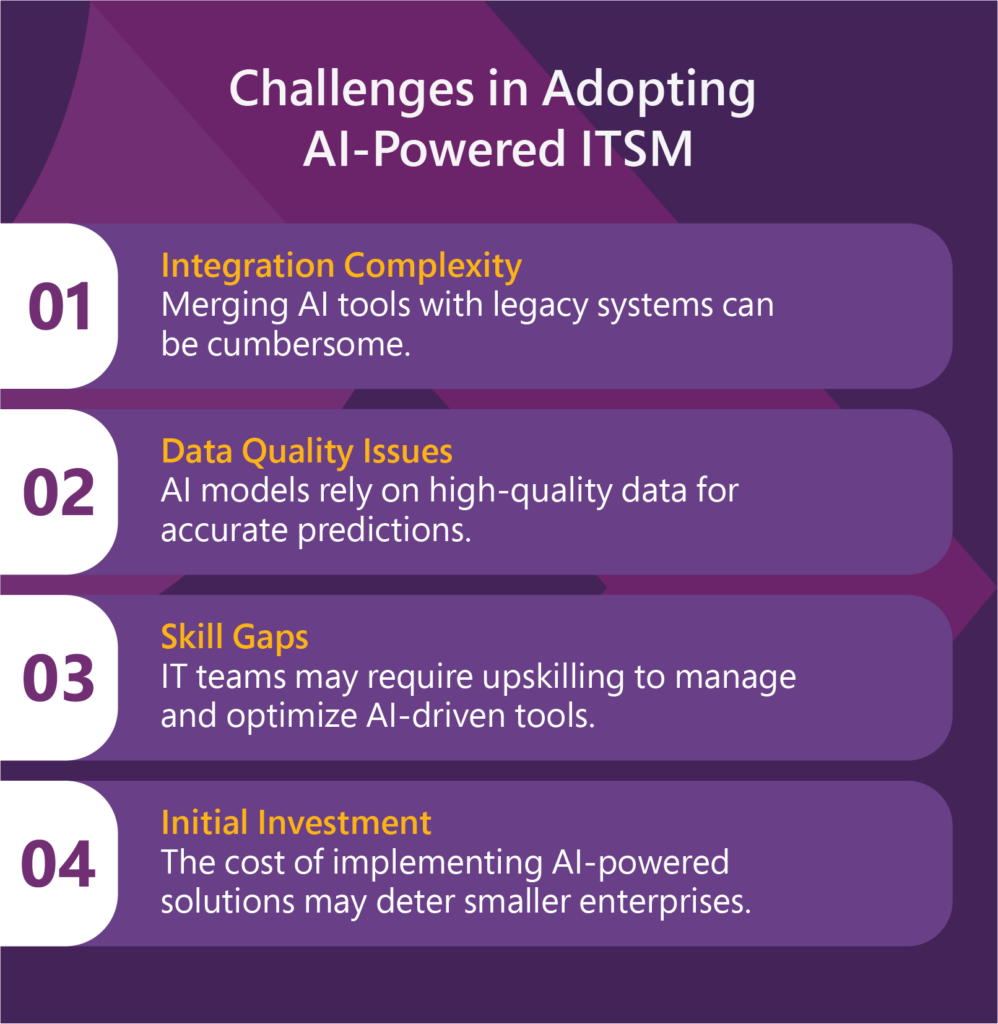
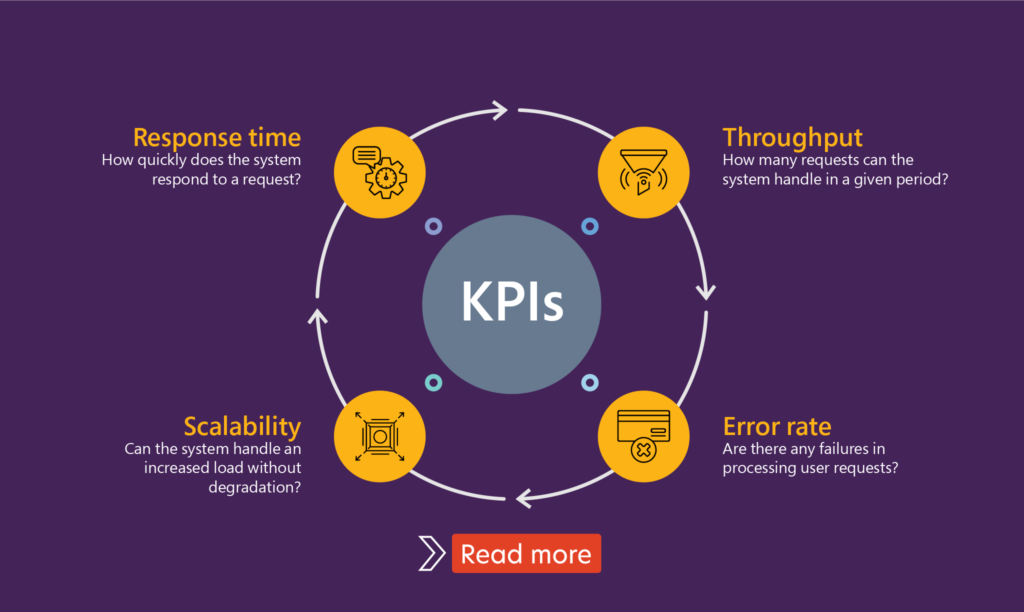
Qinfinite’s Auto Discovery continuously scans and maps your entire enterprise IT landscape, building a real-time topology of systems, applications, and their dependencies across business and IT domains. This rich understanding of the environment is captured in a Knowledge Graph, which serves as the foundation for making sense of observability data by providing vital context about upstream and downstream impacts.
AI is undeniably reshaping the way organizations approach IT Service Management, offering a level of automation, efficiency, and intelligence that traditional methods simply can’t match. As enterprises strive for better incident management, AI presents the opportunity to proactively prevent issues, streamline workflows, and enhance service delivery.
But with the right AI-powered platform, like our intelligent management application platform, Qinfinite, businesses can overcome these challenges and build a robust, future-ready ITSM ecosystem. Qinfinite’s AI-driven capabilities—ranging from automated ticketing systems to root cause analysis—are empowering organizations to drastically reduce incident resolution times, improve operational efficiency, and boost customer satisfaction.
Are you ready to revolutionize your ITSM with AI? Discover how Qinfinite can transform your incident management processes. Request for a free demo today and set your enterprise on the path to smarter operations.
Qinfinite’s Intelligent Incident Management takes observability a step further by converting these actionable insights into automated actions. Once Deep Data Analysis surfaces insights and potential root causes, the platform offers AI-driven recommendations for remediation. But it doesn’t stop there, Qinfinite can automate the entire remediation process. From restarting services to adjusting resource allocations or reconfiguring infrastructure, the platform acts on insights autonomously, reducing the need for manual intervention and significantly speeding up recovery times.
By automating routine incident responses, Qinfinite not only shortens Mean Time to Resolution (MTTR) but also frees up IT teams to focus on strategic tasks, moving from reactive firefighting to proactive system optimization.
AI in IT service management (ITSM) refers to the use of artificial intelligence technologies to automate, optimize, and enhance various IT service management processes. This includes tasks like incident management, problem resolution, change management, and service request fulfillment. AI tools in ITSM can process large amounts of data, identify patterns, predict issues, and provide insights to improve service delivery and customer experiences
AI enhances ITSM processes by automating routine tasks, such as ticket categorization, prioritization, and resolution. AI-powered chatbots and virtual assistants help quickly resolve customer queries, providing instant support. Machine learning algorithms can analyze past incidents to predict future issues, enabling proactive issue management. AI also helps optimize workflows, improve decision-making, and reduce response and resolution times, leading to more efficient operations and better service quality.
Efficiency and Automation: AI automates repetitive tasks, reducing manual workload and speeding up processes.
Improved Customer Experience: AI-powered chatbots and virtual assistants offer instant responses, enhancing user satisfaction.
Predictive Analytics: AI can analyze historical data to predict and resolve potential issues before they become critical.
Better Decision-Making: AI tools provide data-driven insights that help in making informed decisions for service improvements.
Cost Reduction: Automation and optimization reduce the need for manual labor, helping cut operational costs
To implement AI in ITSM, follow these steps:
1. Assess Current Processes: Identify areas where AI can have the most impact, such as incident management, automation, or problem resolution.
2. Choose the Right AI Tools: Select AI tools that align with your ITSM platform and business needs, such as chatbots, machine learning algorithms, or predictive analytics tools.
3. Data Integration: Ensure that AI tools can access and analyze relevant historical data to make informed decisions.
4. Pilot Testing: Begin with a small-scale pilot to test AI functionality and measure its impact before full-scale deployment.
5. Training and Support: Train IT staff to work effectively with AI tools and provide ongoing support for AI system management.
6. Monitor and Optimize: Continuously monitor AI performance, gather feedback, and make adjustments to improve the system’s efficiency.
1. Data Quality and Availability: AI requires clean, accurate, and structured data for effective decision-making. Poor-quality data can lead to incorrect predictions or actions.
2. Integration with Existing Systems: AI tools must integrate seamlessly with your current ITSM platforms and processes, which can be challenging.
3. Change Management: Implementing AI may require changes in workflows and processes, which can be met with resistance from employees.
4. Skill Gaps: IT staff may need new skills to manage AI tools and interpret data-driven insights, necessitating training.
5. Cost and Resources: The initial investment in AI tools and training can be high, which could be a barrier for some organizations.
6. Ethical Concerns: AI decisions may lack transparency, and there may be concerns over privacy and data security when using AI for decision-making.
A recent conversation about prompt engineering led to the inevitable impressionist rendering of an astronaut eating a burger underwater.
Read moreAI can improve the efficiency and effectiveness of chaos engineering. AI algorithms help identify potential false positives
Read moreIn an increasingly AI-driven world, business and technology leaders cannot afford to overlook the impact of AI on the enterprise. And for software development teams, the time is now to understand how AI is shaping the industry.
Read moreGet in touch with Quinnox Inc to understand how we can accelerate success for you.